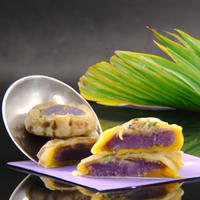
1 serving (100 grams) contains 350 calories, 5.0 grams of protein, 15.0 grams of fat, and 45.0 grams of carbohydrates.

Log this food in SnapCalorie

Nutrition Information
Calories |
833.3 | ||
|---|---|---|---|
% Daily Value* |
|||
| Total Fat | 35.7 g | 45% | |
| Saturated Fat | 11.9 g | 59% | |
| Polyunsaturated Fat | 0 g | ||
| Cholesterol | 23.8 mg | 7% | |
| Sodium | 476.2 mg | 20% | |
| Total Carbohydrates | 107.1 g | 38% | |
| Dietary Fiber | 4.8 g | 17% | |
| Sugars | 47.6 g | ||
| protein | 11.9 g | 23% | |
| Vitamin D | 0 mcg | 0% | |
| Calcium | 47.6 mg | 3% | |
| Iron | 2.4 mg | 13% | |
| Potassium | 357.1 mg | 7% | |
* Percent Daily Values are based on a 2,000 calorie diet. Your daily values may be higher or lower depending on your calorie needs.
Food Attributes
Source of Calories
About Taro pastry
Taro Pastry is a delicate baked treat originating from East and Southeast Asian cuisines, celebrated for its subtly sweet and nutty flavor. Made with a flaky, buttery crust and filled with mashed taro root, sugar, and sometimes coconut milk, it offers a smooth and creamy texture balanced by the crispness of the outer layer. Taro, a starchy root vegetable, provides dietary fiber, potassium, and antioxidants, supporting digestion and heart health. However, the pastry’s richness comes with added sugars and fats, which should be enjoyed in moderation. Often enjoyed during festivals or with tea, Taro Pastry exemplifies a blend of cultural tradition and indulgence.



